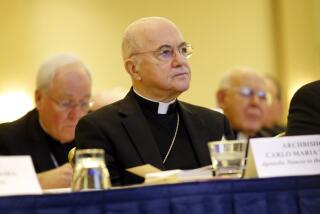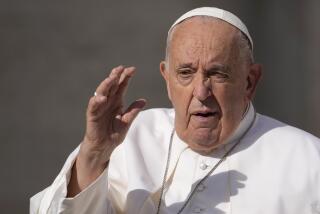Rev. John McNeill dies at 90; gay priest, author expelled by Jesuits
Decades before Pope Francis grabbed the world’s attention with his “Who Am I to judge?” remark about gay priests, the Rev. John McNeill was a pillar of gay theology, whose robust challenge of one of the Roman Catholic Church’s most closely held doctrines got him expelled from his order.
McNeill wrote “The Church and the Homosexual,” a 1976 book that argued that the Bible does not condemn homosexuality. It caused front-page headlines and McNeill’s very public acknowledgment that he was gay.
“In some sense it was my experience of a deep personal love relationship that led me to question church teaching about homosexuality,” McNeill told the Miami Herald in 2014. “I see gay love as another form of human love and just as valid as heterosexual love, and it’s a gift from God to be celebrated and not to be condemned.”
See the most-read stories this hour >>
McNeill, whose scholarly writings helped galvanize gay and lesbian Catholics, died Sept. 22 in Fort Lauderdale, Fla. The 90-year-old author, psychotherapist and pioneer of gay civil rights had cancer, said his nephew, Timothy McNeill.
“He was one of the few in that period of time as a priest who was willing to stick his neck out and speak about the inequalities in the Catholic Church with regard to the LGBT community,” said Patrick McArron, a past president of DignityUSA, a national advocacy group for gay, lesbian, bisexual and transgender Catholics. “We characterize him as a prophet within the organization.”
McNeill decided to enter the priesthood after an incident during World War II.
Born Sept. 2, 1925, into an Irish Catholic family in Buffalo, N.Y., he joined the Army at 17 and was sent to the German front. In 1944, he was captured near the French city of Metz and taken to a prison camp near Leukenwalde, Germany, where he was held for five months.
Although weak from starvation, he was sent to work on a farm. A Polish slave laborer who saw him staring at the food for the animals took pity on him and threw him a potato.
“I made a gesture of thanks and he made the sign of the cross, making it clear that it was because of his religious faith that he was risking his life for me,” McNeill recalled in the Miami Herald. “That made a very deep impression on me.”
After he was liberated and returned to the States, he was admitted to Canisius College in Buffalo. In 1948, he entered the Jesuit novitiate and in 1959 was ordained.
By then he had been struggling for years with his sexual identity but had remained celibate. He did not begin to have gay relationships until he went to Europe to continue his studies for the priesthood. He remained deeply conflicted for years during an academic career that included teaching at Fordham University, Le Moyne College and Woodstock College, all in New York.
His life changed in 1965, a year after he received his doctorate in philosophy from Catholic University of Louvain in Belgium. That New Year’s Eve he met Charles Chiarelli in a New York bar. They became lovers and, in 2008, were married in Canada.
Besides Chiarelli, he is also survived by nieces and nephews.
McNeill and Chiarelli remained firmly in the closet for the first dozen years of their relationship, until McNeill was interviewed about his book by NBC newsman Tom Brokaw. On air with millions of viewers watching, he was asked if he was gay and acknowledged that he was.
He was “torn out of the closet by Tom Brokaw,” McNeill, laughing, recalled later.
From that point on, McNeill was not just a radical theologian but an icon for other Catholics struggling to reconcile their faith with their sexual orientation.
NEWSLETTER: Get the day’s top headlines from Times Editor Davan Maharaj >>
McNeill had written scholarly articles on homosexuality and the Bible several years before his book was published. Three of his writings from 1970 formed the basis of DignityUSA’s position statement in 1972, when the group held its first convention in Los Angeles. McNeill later helped form the group’s New York chapter.
His address to the Dignity convention brought a book contract, but it took several years for “The Church and the Homosexual” to reach print. He received the church’s permission to publish it in 1976 despite a Vatican declaration weeks earlier that a “permanent homosexual condition” was “pathological.”
A year after the book’s release, however, the Congregation for the Doctrine of the Faith — the body charged with enforcing church doctrine — withdrew its permission and ordered the author “not to speak on homosexuality and sexual ethics.”
McNeill publicly obeyed the silencing order but quietly continued to minister to gay Catholics.
In 1986, Cardinal Joseph Ratzinger, the future Pope Benedict XVI who was then chief enforcer of church teaching, called homosexuality an “objective disorder” and instructed bishops to stamp out pro-homosexual views within the church. McNeill criticized Ratzinger’s directive as “cruel.”
In 1987, he was formally expelled from his order. Still a priest but barred from performing most priestly functions, he called himself “a Jesuit in exile.”
He wrote several more books, including “Taking a Chance on God: Liberating Theology for Gays, Lesbians, and Their Lovers, Families and Friends” (1988), and “Freedom, Glorious Freedom: The Spiritual Journey to the Fullness of Life for Gays, Lesbians and Everybody Else” (1995). He also wrote an autobiography, “Both Feet Firmly Planted in Midair: My Spiritual Journey” (1998).
Twitter: @ewooLATimes
More to Read
Start your day right
Sign up for Essential California for the L.A. Times biggest news, features and recommendations in your inbox six days a week.
You may occasionally receive promotional content from the Los Angeles Times.








